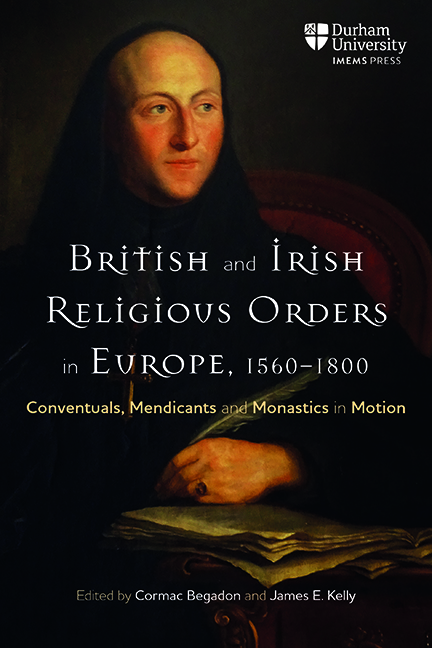 British and Irish Religious Orders in Europe, 1560-1800
British and Irish Religious Orders in Europe, 1560-1800 Published online by Cambridge University Press: 07 October 2022
The involvement of Scots in the Enlightenment movement in eighteenth-century Europe rightly has been given prominence in academic discussion. However, researchers on the ‘Scottish Enlightenment’ have concentrated on philosophes in Scotland to the detriment of Scots resident in other parts of Europe, despite the significant Scottish diaspora that existed. It is notable that a major study makes no reference to Germany. This is of special importance given that the neglect largely concerns that part of the diaspora that was Catholic. The contribution of individual Catholics such as Chevalier Ramsay in France and James Gibbs and Alexander Geddes in England is known, but the achievements of the community of Scottish Benedictines in Germany remain unrecognised, if not unknown, in their homeland. Their contributions to Die Aufklärung, the Enlightenment in Germany, were so important that this must be considered a serious omission.
From the end of the sixteenth century the Scots had maintained three monasteries in southern Germany – Regensburg, Wurzburg and Erfurt. The seventeenth century had been a turbulent and, in many ways, depressing period for the monks due to the turmoil of the Thirty Years War and its aftermath. Towards the end of the century, under the leadership of a strong and charismatic abbot, Thomas (Placid) Fleming, their fortunes were restored both financially and in the standing they held among their German hosts, civic and ecclesiastical, as well as in the Catholic community in Scotland. This had taken Fleming nearly fifty years, with his final great achievement being the formal establishment of a seminary in Regensburg in 1713. The registers of his college show that approximately one hundred students enrolled from its formal inception to the end of the eighteenth century.4 Among these students were young men and boys of intelligence who made significant contributions to Germany's intellectual, as well as religious, life. They received an excellent higher education, in part through the cooperative arrangements that Fleming had made with German Benedictines of the University of Salzburg. In addition, the Scots had built up a Benedictine presence at the University of Erfurt to the extent that they dominated the running of the university for the greater part of the eighteenth century.
To save this book to your Kindle, first ensure [email protected] is added to your Approved Personal Document E-mail List under your Personal Document Settings on the Manage Your Content and Devices page of your Amazon account. Then enter the ‘name’ part of your Kindle email address below. Find out more about saving to your Kindle.
Note you can select to save to either the @free.kindle.com or @kindle.com variations. ‘@free.kindle.com’ emails are free but can only be saved to your device when it is connected to wi-fi. ‘@kindle.com’ emails can be delivered even when you are not connected to wi-fi, but note that service fees apply.
Find out more about the Kindle Personal Document Service.
To save content items to your account, please confirm that you agree to abide by our usage policies. If this is the first time you use this feature, you will be asked to authorise Cambridge Core to connect with your account. Find out more about saving content to Dropbox.
To save content items to your account, please confirm that you agree to abide by our usage policies. If this is the first time you use this feature, you will be asked to authorise Cambridge Core to connect with your account. Find out more about saving content to Google Drive.